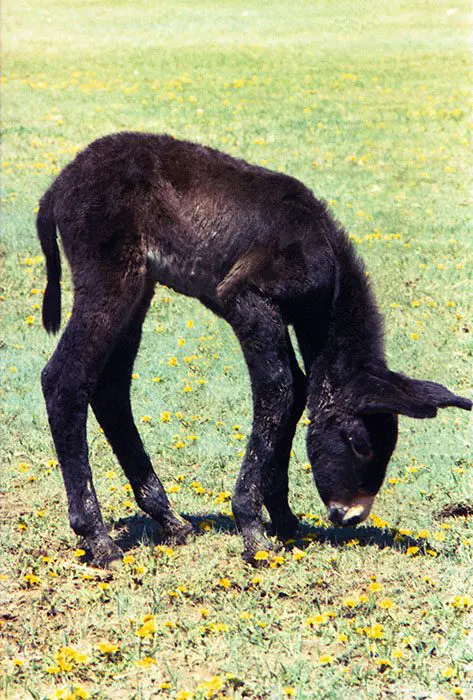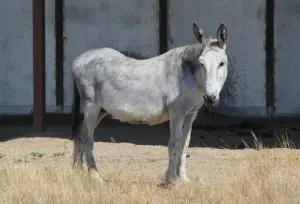MULE CROSSING: Donkey Talk
By Meredith Hodges
Donkeys are indigenous to desert areas that are often extremely hot or extremely cold. They are tough, surefooted due to the unique shape of their hooves, resistant to parasites, and disease and can withstand wide variations in climate. They require very little to survive and actually prefer the wide variety of brush and weeds that occur naturally in the desert with one of their favorite foods being dandelions.

Donkeys possess an incredible hair coat that does not shed off completely like horses do in the summer months. In their first year, a young donkey will keep his thick hair coat throughout the summer and won’t lose most of the hair until August.

In August, he will not have the thick hair coat, but will retain some longer, wispy hair unlike the horse. This thick hair is meant to insulate the foal against extreme heat and cold until he is able to develop enough body fat to help regulate the temperature throughout his body. It will stay thick inside the ears and will protect the donkey foal from parasites, bugs and severe trauma.

In one short month, the young donkeys will begin to grow back their thicker, winter under-coat in September in preparation for the cold.

As the donkey ages into the prime of his life, he has a covering of body fat to help keep his temperature insulated and the thicker hair is no longer as long and shaggy. Of course, there are some breeds of donkeys that will grow more thick hair than others, but the shaggy hair as an adult is generally reserved for the French Poitou Donkeys.
As the donkey gets to be over 25 years of age, he will begin to grow thicker hair year round to compensate for his loss of body fat due to old age.



When we show our donkeys, we body clip them, but if this is done, it is imperative to blanket them if it gets too cold and provide a light sheet during the cool summer nights.
Understand that they now no longer have the PROTECTION of their unique hair coat. When traveling, donkeys will sit back in the trailer and can rub themselves raw during the ride, especially if they have been clipped. When unclipped, the hair coat will keep this kind of damage to a minimum.

If your donkey does get these kinds of sores, they can usually be healed fairly quickly with a daily application of Neosporin ointment (Photo below was taken one week later). Note that when you clip, there is also the consideration of sunburn.

If you clip your donkey for show and need to haul any distance at all, you should protect his precious rear end by using a blanket or sheet secured over the hind quarters. The best course of action is not to body clip your donkey at all if you do not show. Remember, he’s a desert animal and Mother Nature has already provided him the protection that he needs against the elements.


To learn more about Meredith Hodges and her comprehensive all-breed equine training program, visit LuckyThreeRanch.com, MEREDITH HODGES PUBLIC FIGURE Facebook page, or call 1-800-816-7566. Check out her children’s website at JasperTheMule.com. Also, find Meredith on Pinterest, Instagram, MeWe, YouTube and Twitter.
© 2017, 2018, 2021 Lucky Three Ranch, Inc. All Rights Reserved.




